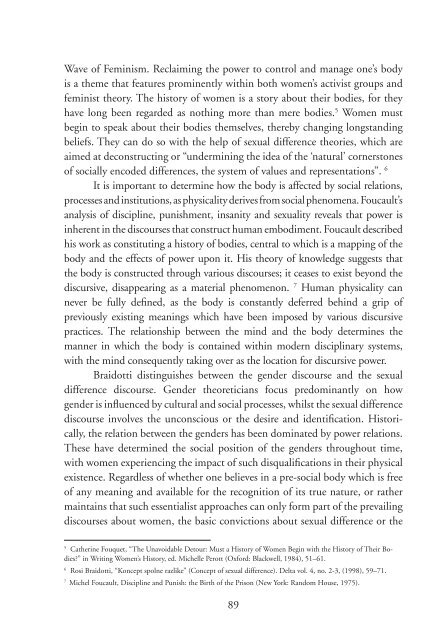Teaching Gender in Social Work - MailChimp
Teaching Gender in Social Work - MailChimp
Teaching Gender in Social Work - MailChimp
You also want an ePaper? Increase the reach of your titles
YUMPU automatically turns print PDFs into web optimized ePapers that Google loves.
Wave of Fem<strong>in</strong>ism. Reclaim<strong>in</strong>g the power to control and manage one’s body<br />
is a theme that features prom<strong>in</strong>ently with<strong>in</strong> both women’s activist groups and<br />
fem<strong>in</strong>ist theory. The history of women is a story about their bodies, for they<br />
have long been regarded as noth<strong>in</strong>g more than mere bodies. 5 Women must<br />
beg<strong>in</strong> to speak about their bodies themselves, thereby chang<strong>in</strong>g longstand<strong>in</strong>g<br />
beliefs. They can do so with the help of sexual difference theories, which are<br />
aimed at deconstruct<strong>in</strong>g or “underm<strong>in</strong><strong>in</strong>g the idea of the ‘natural’ cornerstones<br />
of socially encoded differences, the system of values and representations”. 6<br />
It is important to determ<strong>in</strong>e how the body is affected by social relations,<br />
processes and <strong>in</strong>stitutions, as physicality derives from social phenomena. Foucault’s<br />
analysis of discipl<strong>in</strong>e, punishment, <strong>in</strong>sanity and sexuality reveals that power is<br />
<strong>in</strong>herent <strong>in</strong> the discourses that construct human embodiment. Foucault described<br />
his work as constitut<strong>in</strong>g a history of bodies, central to which is a mapp<strong>in</strong>g of the<br />
body and the effects of power upon it. His theory of knowledge suggests that<br />
the body is constructed through various discourses; it ceases to exist beyond the<br />
discursive, disappear<strong>in</strong>g as a material phenomenon. 7 Human physicality can<br />
never be fully def<strong>in</strong>ed, as the body is constantly deferred beh<strong>in</strong>d a grip of<br />
previously exist<strong>in</strong>g mean<strong>in</strong>gs which have been imposed by various discursive<br />
practices. The relationship between the m<strong>in</strong>d and the body determ<strong>in</strong>es the<br />
manner <strong>in</strong> which the body is conta<strong>in</strong>ed with<strong>in</strong> modern discipl<strong>in</strong>ary systems,<br />
with the m<strong>in</strong>d consequently tak<strong>in</strong>g over as the location for discursive power.<br />
Braidotti dist<strong>in</strong>guishes between the gender discourse and the sexual<br />
difference discourse. <strong>Gender</strong> theoreticians focus predom<strong>in</strong>antly on how<br />
gender is <strong>in</strong>fluenced by cultural and social processes, whilst the sexual difference<br />
discourse <strong>in</strong>volves the unconscious or the desire and identification. Historically,<br />
the relation between the genders has been dom<strong>in</strong>ated by power relations.<br />
These have determ<strong>in</strong>ed the social position of the genders throughout time,<br />
with women experienc<strong>in</strong>g the impact of such disqualifications <strong>in</strong> their physical<br />
existence. Regardless of whether one believes <strong>in</strong> a pre-social body which is free<br />
of any mean<strong>in</strong>g and available for the recognition of its true nature, or rather<br />
ma<strong>in</strong>ta<strong>in</strong>s that such essentialist approaches can only form part of the prevail<strong>in</strong>g<br />
discourses about women, the basic convictions about sexual difference or the<br />
5<br />
Cather<strong>in</strong>e Fouquet, “The Unavoidable Detour: Must a History of Women Beg<strong>in</strong> with the History of Their Bodies?”<br />
<strong>in</strong> Writ<strong>in</strong>g Women’s History, ed. Michelle Perott (Oxford: Blackwell, 1984), 51–61.<br />
6<br />
Rosi Braidotti, “Koncept spolne razlike” (Concept of sexual difference). Delta vol. 4, no. 2-3, (1998), 59–71.<br />
7<br />
Michel Foucault, Discipl<strong>in</strong>e and Punish: the Birth of the Prison (New York: Random House, 1975).<br />
89

















